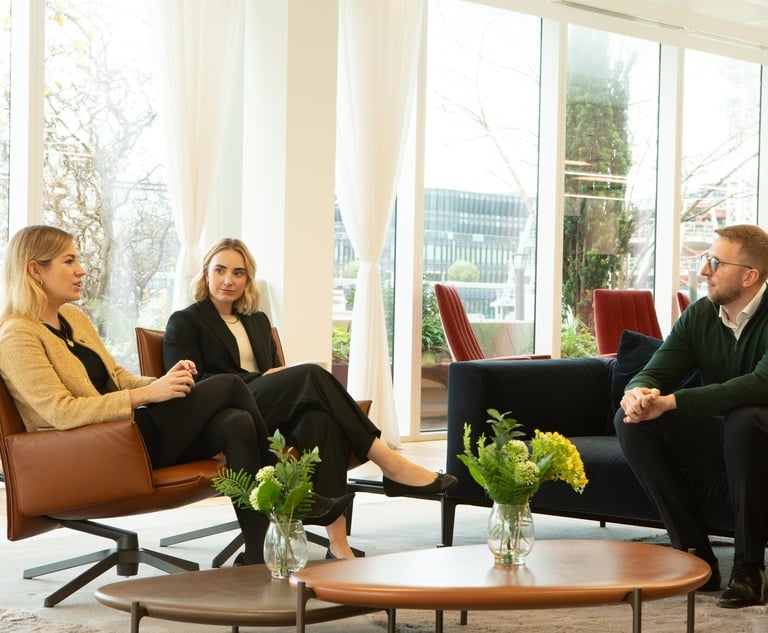An A&O Partner's Pride Story – 'Coming Out Allowed Me To Bring So Much More To Life'
The Magic Circle partner speaks out about coming out and dealing with questions about a wife and kids.
June 26, 2019 at 06:50 AM
3 minute read
 Allen & Overy partner Will Samengo-Turner
Allen & Overy partner Will Samengo-Turner
As part of Pride Month, Law.com's Legal Week spoke to Allen & Overy partner William Samengo-Turner about his experience as an openly gay man in the legal industry. Here, he explains how important senior role models aided his journey to coming out at work, and why junior lawyers shouldn't feel pressurised to if it doesn't feel right.
I came out relatively late. Everyone has their own journey and their own story. I would tell junior lawyers: only come out when you are ready, it's not a race. It's a wonderful thing when you do, but you need to feel comfortable and safe in an environment that you are happy with both at work and at home. Coming out allowed me to bring so much more to life inside and outside of the office.
Having senior people in the business who are visibly gay and successful, like Jim Ford and David Stone at A&O, removed a lot of doubt around wanting to come out and feeling comfortable, safe and celebrated in doing so.
I wasn't particularly nervous in coming out at work because I knew everyone so well, but even so I was surprised at the outpouring of love and support. It was a good reminder of the quality of the people I work with, and I can see the importance of creating an atmosphere and environment that is open and accepting.
I have never been the victim of any sort of discrimination or abuse at work, and I never felt held back or excluded because of my sexuality either. I like to think that if I ever felt that way I'd have called it out.
However, there are situations in which LGBT people need to make a decision as to whether they correct heteronormative assumptions. There are moments when talking to clients or colleagues where they might ask about your wife and kids, where you can easily become awkward. Someone who's straight doesn't necessarily have to consider situations like that on a daily basis.
I recognise that being a white gay man, my experience is very likely to have been easier than that of many other members of the LGBTQ community and I think it is important that people in my position are focussed on being agents for change.
I think there has been a change in the way that law firms approach that topic, and that they have come a huge way. I don't think we used to have conversations around LGBT inclusion and diversity as we do now. During the past five years, the focus has shifted from making people feel comfortable and accepted – that should be a given – to pushing harder and making them feel they can excel and be celebrated for who they are.
If the business doesn't create an environment where people feel comfortable to come out, be themselves and bring their best self to work every day, then it's missing out on the pool of talent from which it could recruit. I think visibility is a key thing. The old-school 'pale, male and stale' idea of law firms is something that we've had to challenge.
This content has been archived. It is available through our partners, LexisNexis® and Bloomberg Law.
To view this content, please continue to their sites.
Not a Lexis Subscriber?
Subscribe Now
Not a Bloomberg Law Subscriber?
Subscribe Now
NOT FOR REPRINT
© 2025 ALM Global, LLC, All Rights Reserved. Request academic re-use from www.copyright.com. All other uses, submit a request to [email protected]. For more information visit Asset & Logo Licensing.
You Might Like
View All
Paul Weiss Says Progress Means 'Embracing the Uncomfortable Reality'
5 minute read

GCs Say They are Getting 'Edged Out' of UK Boardrooms
Trending Stories
- 1'It's Not Going to Be Pretty': PayPal, Capital One Face Novel Class Actions Over 'Poaching' Commissions Owed Influencers
- 211th Circuit Rejects Trump's Emergency Request as DOJ Prepares to Release Special Counsel's Final Report
- 3Supreme Court Takes Up Challenge to ACA Task Force
- 4'Tragedy of Unspeakable Proportions:' Could Edison, DWP, Face Lawsuits Over LA Wildfires?
- 5Meta Pulls Plug on DEI Programs
Who Got The Work
Michael G. Bongiorno, Andrew Scott Dulberg and Elizabeth E. Driscoll from Wilmer Cutler Pickering Hale and Dorr have stepped in to represent Symbotic Inc., an A.I.-enabled technology platform that focuses on increasing supply chain efficiency, and other defendants in a pending shareholder derivative lawsuit. The case, filed Oct. 2 in Massachusetts District Court by the Brown Law Firm on behalf of Stephen Austen, accuses certain officers and directors of misleading investors in regard to Symbotic's potential for margin growth by failing to disclose that the company was not equipped to timely deploy its systems or manage expenses through project delays. The case, assigned to U.S. District Judge Nathaniel M. Gorton, is 1:24-cv-12522, Austen v. Cohen et al.
Who Got The Work
Edmund Polubinski and Marie Killmond of Davis Polk & Wardwell have entered appearances for data platform software development company MongoDB and other defendants in a pending shareholder derivative lawsuit. The action, filed Oct. 7 in New York Southern District Court by the Brown Law Firm, accuses the company's directors and/or officers of falsely expressing confidence in the company’s restructuring of its sales incentive plan and downplaying the severity of decreases in its upfront commitments. The case is 1:24-cv-07594, Roy v. Ittycheria et al.
Who Got The Work
Amy O. Bruchs and Kurt F. Ellison of Michael Best & Friedrich have entered appearances for Epic Systems Corp. in a pending employment discrimination lawsuit. The suit was filed Sept. 7 in Wisconsin Western District Court by Levine Eisberner LLC and Siri & Glimstad on behalf of a project manager who claims that he was wrongfully terminated after applying for a religious exemption to the defendant's COVID-19 vaccine mandate. The case, assigned to U.S. Magistrate Judge Anita Marie Boor, is 3:24-cv-00630, Secker, Nathan v. Epic Systems Corporation.
Who Got The Work
David X. Sullivan, Thomas J. Finn and Gregory A. Hall from McCarter & English have entered appearances for Sunrun Installation Services in a pending civil rights lawsuit. The complaint was filed Sept. 4 in Connecticut District Court by attorney Robert M. Berke on behalf of former employee George Edward Steins, who was arrested and charged with employing an unregistered home improvement salesperson. The complaint alleges that had Sunrun informed the Connecticut Department of Consumer Protection that the plaintiff's employment had ended in 2017 and that he no longer held Sunrun's home improvement contractor license, he would not have been hit with charges, which were dismissed in May 2024. The case, assigned to U.S. District Judge Jeffrey A. Meyer, is 3:24-cv-01423, Steins v. Sunrun, Inc. et al.
Who Got The Work
Greenberg Traurig shareholder Joshua L. Raskin has entered an appearance for boohoo.com UK Ltd. in a pending patent infringement lawsuit. The suit, filed Sept. 3 in Texas Eastern District Court by Rozier Hardt McDonough on behalf of Alto Dynamics, asserts five patents related to an online shopping platform. The case, assigned to U.S. District Judge Rodney Gilstrap, is 2:24-cv-00719, Alto Dynamics, LLC v. boohoo.com UK Limited.
Featured Firms
Law Offices of Gary Martin Hays & Associates, P.C.
(470) 294-1674
Law Offices of Mark E. Salomone
(857) 444-6468
Smith & Hassler
(713) 739-1250









